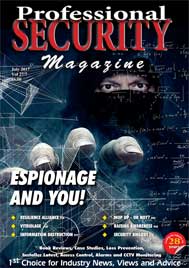The other Friday I was walking across Sheffield city centre when I stopped at a ‘Sheffield Makes Music’ open-air concert outside the City Hall. The music didn’t make me stop – in fact I wanted to get away from it – but I paused and took a photo of the event security (page 41). Showsec had so far as I could see three uniformed stewards around the square. It was in line with recent police pleas for private security people, ‘eyes and ears’, to own public space, to take some of the load off police. Fair enough; but was this all, as this was a typical ‘crowded place’ – not that crowded, it was 4.30pm – and just the sort that might be a target for an act of terror, as at the Manchester Arena and London Bridge.
I turned round to walk on and my answer was standing in front of me; a pair of armed, black-uniformed policemen. They weren’t there when I passed an hour later, but they had made their point. While it’ll take a while for perspective, the two attacks brought soldiers into public space protective security, and prompted new security search regimes at venues. Poignantly the event security firm at Manchester Arena is Showsec. In interview with their MD Mark Harding in January, he spoke of how the company had a help line for staff, used about once a month, for workers to raise anything concerning or distressing – the example Mark gave was of a festival steward, doing a search of tents after an event, coming across a dead body. It’s a mercy that we never know what’s coming.
After the Manchester and London attacks, as during IRA bombing campaigns and natural disasters, people have a way of helping one another. What you might call civic society springs up, while local and central government might falter, or simply be on holiday or otherwise busy. Hotels, the Salvation Army, householders, open their doors. But those people of good-will, and the heroic ones who did their best to stop the Borough Market knife attackers, don’t have blank minds. They act without second thought, but on the sum of their knowledge, which has to come from somewhere. That makes the messages such as ‘Run-Hide-Tell’ and forethought such as a pub putting their exact address and postcode above the ‘phone in the bar (page 46) so important. Raising the awareness of people, then, is bound to be good, then? even if people might not pay attention to what they’re being taught, until they need it, when it’s too late to practice, or plan. Angela Sasse says not, in terms of information security (page 54) at least.
Acid used as a weapon (page 38), the scams we forever have to watch for (Jim Gannon, page 16), the replacing static guards with mobile, which, Paula Mathers argues, brings worse outcomes all round (page 36); it’s a grim summer. Yet there’s good around. The outstanding work of companies and individuals as celebrated at the ACS Pacesetters lunch (pages 18 and 21) and indeed Professional Security’s own Women in Security award (as previewed by Una Riley, page 26). It may sound corny, but the best advice I was ever given – to cut a long story short – was: ‘you just do the best you can’.
You can read the July 2017 print issue on the ‘magazine‘ part of the website.










